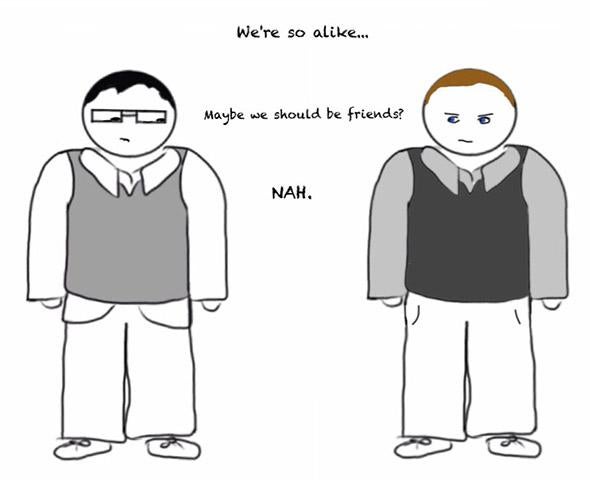Butch women aren’t men—except for the ones who transition to male, which happens just often enough to make things awkward for everyone involved. It’s awkward for fellow butches who feel strongly that they are not men, for trans men who seek to distinguish themselves from masculine women, and for butches whose understanding of themselves evolves in ways they hadn’t expected it to—each group challenges the self conception of the others. Many masculine women remain happily within the female gender for their entire lives and experience no discernable dysphoria. However, there are also butches who experience discomfort with their female gender or who seek to change their bodies to attain a more masculine appearance. The borders between butch women, masculine genderqueer people, and trans men are clearer in theory than in practice. In order to find out more about how people in these categories experience gender, I spoke with individuals from across the butch/trans spectrum, from female-identified butches to formerly butch-identifying trans men, and found commonalities, as well as differences, among them.
Shay Lima, 27, is tall and broad. We’re friends through my wife, who went to school with her. Shay has often been mistaken for male; she’s even been forcibly ejected from women’s bathrooms based on this misperception. At one party I attended, despite her having long hair and being dressed in female clothing at the time, she was mistaken for male by a partygoer who all but insisted her perception of Shay’s gender could not be wrong. Shay strongly identifies as a lesbian, and she doesn’t object to being called butch, although she’s never felt strongly drawn to that description.
“I guess I’m butch, but that’s not in the front of my mind. I’m a woman, no doubt, and for most people I’m more like a ‘butch lesbian’ because I’m not girly at all,” Shay told me. Commenting on society’s apparent need to label, she observed, “There are feminine people and masculine people, but they only call it something when you’re going against what people expect you to be.”
Shay is confident in her identity as a woman, clear and comfortable about her own masculinity, and knows enough about trans identities to know that she’s not trans. (One of her best friends from high school transitioned from female to male.) She does not experience gender dysphoria and is attracted solely to other women, never men. This is what most people think of when they think of butch lesbians. But hers is not the only experience among butches.
H, an online acquaintance who requested anonymity, describes herself as a “straight butch” and occasionally as genderqueer. She describes her current identity as “a woman who is masculine in as many ways as possible—a woman who embraces masculinity,” but things were not always so simple. In college, H tried transitioning to male and was passing consistently as a man before she realized that, in spite of her masculinity, she didn’t want to stop being female. She blames her struggle to accept her own femaleness on the way that our culture has made very little room for masculine straight women and half-jokingly complains that her life would have been far easier if only she’d been attracted to other women.
Even among masculine lesbians, however, questioning one’s gender identity is not uncommon. I spoke with Lauren, a 35-year-old, married lesbian who has considered transitioning to male at several points in her life. I also spoke with Jay, a trans man in his early 40s who identified as a butch woman for many years and transitioned only recently. Both Lauren and Jay described having felt uncomfortable with being seen as girls in childhood (and a current reluctance with having their last names used for this article), they both described sensing that they’d found a home in the gay community in late adolescence or early adulthood.
Lauren says that she considers transitioning to male “every few years. …. And, every time I come up 35/65 … right up to the line, but not quite over it.” She describes wanting her body to look more masculine, and sees “top surgery” (breast removal combined with cosmetic surgery to create a male-appearing chest) as a long-term goal she’s saving toward.
Jay, on the other hand, describes feeling far more comfortable in his gender identity post-transition and says that his prior embrace of a butch identity was largely because he “never had the words” to describe the ways he felt different from other women. I asked both Jay and Lauren how they’d feel if they woke up in the body of a cisgender man. Lauren said she thought she’d like some things, but ultimately would want to change back to the way she is now. Jay, on the other hand, told me: “I think I’d be relieved. That’s the ideal. If I could snap my fingers and be [a cisgender] male, I’d do it, no hesitation.” Both seriously considered transitioning, and both may even be said to have experienced some dysphoria. For Jay it was strong and persistent enough to lead him toward a binary transition; for Lauren it has not been.

Illustration by Vanessa Vitiello Urquhart
In between, or perhaps outside of, the categories of masculine woman and transgender man there lies a third option, that of genderqueer or nonbinary identitiy. Kyle Jones, a butch genderqueer blogger in his early 50s, went through name and pronoun changes and has been on testosterone long enough to consistently pass for male, but he continues to consider his history of femaleness and feminist activism to be a big part of his identity. His gender identity is neither male nor female, but, rather, butch. He describes being “increasingly comfortable” with his non-binary identity, and with transitioning in his own way—a way that stops short of becoming totally male-identified.
Kyle has occasionally been on the receiving end of hate mail from female-identified butches who object to a trans person using the term butch. We spoke about the tensions between the “three camps” of butch lesbians, trans men, and masculine nonbinaries. “People get tired of having to educate others, and it can turn in to really bitter feuds and arguments,” he told me. “We all want to be seen, we all want to be recognized, and there is way more that we have in common than that we have different. “
It’s not new to observe the existence of these areas of overlap between butchness and transgender. The seminal text of all things butch, Leslie Feinberg’s Stone Butch Blues, is as much about trans issues as it is about butchness. Feinberg was also an early adopter of transgender, which has now largely replaced all other terms for gender variance. Butch is a legacy identity, dating from a time before we understood gender as something that could change or fall between the poles of male and female. Individuals who identify as butch, or who have identified that way at some point in their lives, may now find themselves on different points along the gender spectrum. In the long run, there may be no way to save this dinosaur of an identity—or butch may eventually be nailed down to a single point rather than encompassing multitudes. For the present, however, what butch means depends on which butch you pose the question to, and it is rare to find two butches who will give you the exact same answer.
